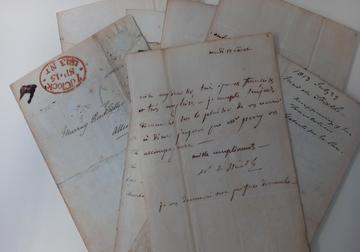Literatures are never at war—France and the John Murray Archive
Applications are invited for an Open-Oxford-Cambridge AHRC DTP-funded Collaborative Doctoral Award at Oxford, in partnership with the National Library of Scotland.
This fully-funded studentship is available from October 2025. Further details about the value of an Open-Oxford-Cambridge AHRC DTP award are available on the DTP’s studentships page. [If you have secured additional funding from the partner organisation or other source, please detail here.]
An additional relocation grant will be provided by the NLS and the OOCDTP.

Closing date: 7th January [midday, UK time]
Project overview
“Literatures are never at war”, Marie-Joseph Chénier wrote in an 1805 translation of Gray’s Elegy, defending the idea that cross-cultural relations were essential for the life of letters even in a country in conflict with its neighbours. John Murray II (1778-1843), the famous publisher, strove to demonstrate this for instance when he published Germaine de Staël’s On Germany (1813) —in both French and English versions— after the proofs had been seized and destroyed in France on the orders of Napoleon’s minister for police. In the treatise, Staël introduced German Romanticism to much of Europe and helped sow the seeds of modern conceptions of world literature. She became “The most famous woman in Europe” as contemporaries termed her, the only person whose celebrity could trump that of Byron, also one of Murray’s bestselling writers. As well as championing authors like Staël, the publishing house played a central role in opening up the continent to British travellers, e.g. by bringing out Jane Waldie and Charlotte Anne Eaton’s narratives of their residence in Belgium—they were among the first to visit the battlefield at Waterloo—and their travels in France, Switzerland and Italy. John Murray III (1808-1892) was running the firm when Eaton’s best-seller based on her experiences, Continental Adventures: A Novel (1826) came out and he oversaw the creation of an influential series of guidebooks (the Handbooks for Travellers)—often including extracts of works of literature—to make tourism, in European countries and subsequently beyond, attractive to a wide variety of visitors. Correspondence in the Murray Archive bears witness to the importance of the firm as a hub for exchanges with writers and translators—Louise Swanton Belloc, for instance, one of John Murray III’s Paris correspondents, was a renowned author but also a cultural intermediary and the translator of Edgeworth, Gaskell, Moore, Dickens and Darwin amongst others.
Thanks to the John Murray Archive at the National Library of Scotland, the doctoral student will prepare a thesis focused on some aspect of the publisher’s relations with France and/or continental Europe during the Romantic period. This could for instance be centred on one or several of the French-language writers published by Murray (the holdings include correspondence and accounts), on translations and reception, or on the elaboration and dissemination of travel literature: there is ample scope for the student to shape their approach according to their interests. Based on primary research in exceptional archival holdings, the thesis will make an important contribution to the field of Franco-British literary and editorial relations: so far, as the NLS website shows, the European (and chiefly French-language) angle of the John Murray Archive has remained largely unexplored. The doctoral project will have an impact on our knowledge of the circulation of texts and authors whilst casting light on an essential cultural operator of the early 19th century and its ramifications beyond Britain. It will also lead to increased knowledge of one of the most important archival holdings in the history of British publishing.
As part of the doctoral collaboration, the student (who will be expected to spend much of the second year of their thesis in Edinburgh) will undertake a piece of work to inform ways in which the Library makes non-English-language material available. This will involve surveying foreign-language documents in the collections, thinking about cataloguing and presenting texts online and speaking to other institutions about the management of collections where in-house expertise in languages is lacking.
Supervision
Catriona Seth FBA MAE, Marshal Foch Professor of French Literature, University of Oxford
Dr Kirsty McHugh, Curator, John Murray Archive & Publishers’ Collections, National Library of Scotland, Edinburgh
How to apply
We invite applications from candidates from all backgrounds and ethnicities. Applicants will ideally have an excellent degree in French or be a fluent French-speaker with a degree in another apposite Humanities subject (Comparative literature, History, English etc.).
Prior interest in the history of the book, publishing, working with manuscripts and/or the Romantic period would be appreciated but is not a requirement.
Applicants should meet the eligibility criteria for Open-Oxford-Cambridge AHRC studentships.
For an informal discussion about the opportunity and how you might frame your approach to the CDA project, please contact Catriona Seth (Catriona.Seth@mod-langs.ox.ac.uk) in the first instance.
You should apply to the Oxford Medieval and Modern Languages Doctoral Programme by 7th January (midday, UK time), indicate your interest in being considered for an Open-Oxford-Cambridge AHRC DTP studentship and submit a completed copy of the OOC DTP Application Form at the same time.


